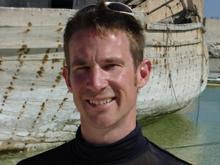A very fishy Big Green Week
Well the BIG Green Week has finally drawn to a close, and what a week it was! Let's hope it can become an annual event on the Bristol Calender. Huge congratulations to Paul Rainger and Darren Hall, Forum for the Future, the army of volunteers and the 40,000 visitors that took part in a truly inspiring week.
As a Cabot Institute Knowledge Exchange Fellow at the University of Bristol, the event provided some great opportunities for me to talk to the public about the work we are doing on the Future of Fisheries and effects of climate change on fish and marine ecosystems (full details here).
 Our first event was at the Saturday Bristol's BIG Market, where a team of us ran a Future of Fisheries stall on St Stephen's Avenue with fishing for children (and several over-competitive adults!), 13 species of UK fish to hold, poke and investigate, and displays about our research on the recent effects of climate change on European fisheries and predictions of future fisheries. We had plenty of information on how to make the right choices as consumers, including hundreds of copies of the Good Fish Guide that we gave out, information about the Marine Stewardship Council accreditation scheme, and the chance to sign up to Hugh Fearnley-Whittingstall's Fish Fight. I'm pleased to say my noble volunteers have finally finished eating their way through all the wonderful fish provided by The Fish Shop on Gloucester Road, and hopefully many Bristolians have since tried baked John dory, stargazy pie and bycatch paella.
Our first event was at the Saturday Bristol's BIG Market, where a team of us ran a Future of Fisheries stall on St Stephen's Avenue with fishing for children (and several over-competitive adults!), 13 species of UK fish to hold, poke and investigate, and displays about our research on the recent effects of climate change on European fisheries and predictions of future fisheries. We had plenty of information on how to make the right choices as consumers, including hundreds of copies of the Good Fish Guide that we gave out, information about the Marine Stewardship Council accreditation scheme, and the chance to sign up to Hugh Fearnley-Whittingstall's Fish Fight. I'm pleased to say my noble volunteers have finally finished eating their way through all the wonderful fish provided by The Fish Shop on Gloucester Road, and hopefully many Bristolians have since tried baked John dory, stargazy pie and bycatch paella. On Thursday I was lucky to have the run of the Triodos Bank skyptop canteen for a screening of Charles Clover and Rupert Murray's superb film End of the Line. This is a must-see but heartwrenching, devestating and tragic investigation of the current state of world's fisheries, featuring many of the world's top scientists (Daniel Pauly: "We are fighting a war against fish, and winning"; Boris Worm: "The world's fisheries could run out by 2050"), which thankfully finishes with a strong message of hope (Callum Roberts: "Marine Protected Areas can build stocks"). The film led into a solid hour of discussion, where we were joined by Greenpeace with their 10-foot mackerel promoting their Common Fisheries Policy campaign. Again our discussions considered which fish are great to eat (mackerel, sardines, coley, dab) and which are better to avoid (rays, monkfish, Patagonian toothfish).
On Thursday I was lucky to have the run of the Triodos Bank skyptop canteen for a screening of Charles Clover and Rupert Murray's superb film End of the Line. This is a must-see but heartwrenching, devestating and tragic investigation of the current state of world's fisheries, featuring many of the world's top scientists (Daniel Pauly: "We are fighting a war against fish, and winning"; Boris Worm: "The world's fisheries could run out by 2050"), which thankfully finishes with a strong message of hope (Callum Roberts: "Marine Protected Areas can build stocks"). The film led into a solid hour of discussion, where we were joined by Greenpeace with their 10-foot mackerel promoting their Common Fisheries Policy campaign. Again our discussions considered which fish are great to eat (mackerel, sardines, coley, dab) and which are better to avoid (rays, monkfish, Patagonian toothfish).
Finally, on Friday it was time to head to court, or at least a rather sophisticated mock-up at Bordeaux Quay, where the Secretary of State was "tried" in front of a jury made up of Bristol school pupils for "Ecocide". The idea was simple. As head of Defra and so the figurehead in charge of allocating the UK fishing quota to the fleet, Caroline Spelman is committing ecocide by choosing to licence fishing with potentially destructive gear and above scientifically-determined limits, since the inhabitants of the sea (marine creatures) and neighbouring regions (including humans, both present and future) are being illegally disturbed or destroyed. After some great expert witnesses (including Sir Graham Watson - MEP; Jean-Luc Solandt - Marine Conservation Society; Tom Appleby - Marine Lawyer; Jonathon Porritt - Director Forum for the Future; Kelvin Boot - Climate Change Journalist; Charles Redfren - Fish4Ever; Jeremy Percy - Under 10m Inshore Fleet), and some emotional summing up from the dedicated lawyers, the jury finished hung with a slight majority (8:4) in favour of a guilty verdict. As the concept of Ecocide gathers pace, watch out politicians: your decisions that often threaten our precious planet and resources may one day be brought to account.
Now that the smell of fish is finally fading from my hands, and the last few tweets drift away like sardine scales after a feeding frenzy, I give many thanks to all those involved in the fishy activities at the BIG Green Week. I hope we will all return, bigger, fishier, and more positive about the state of fisheries for the BGW2013...
